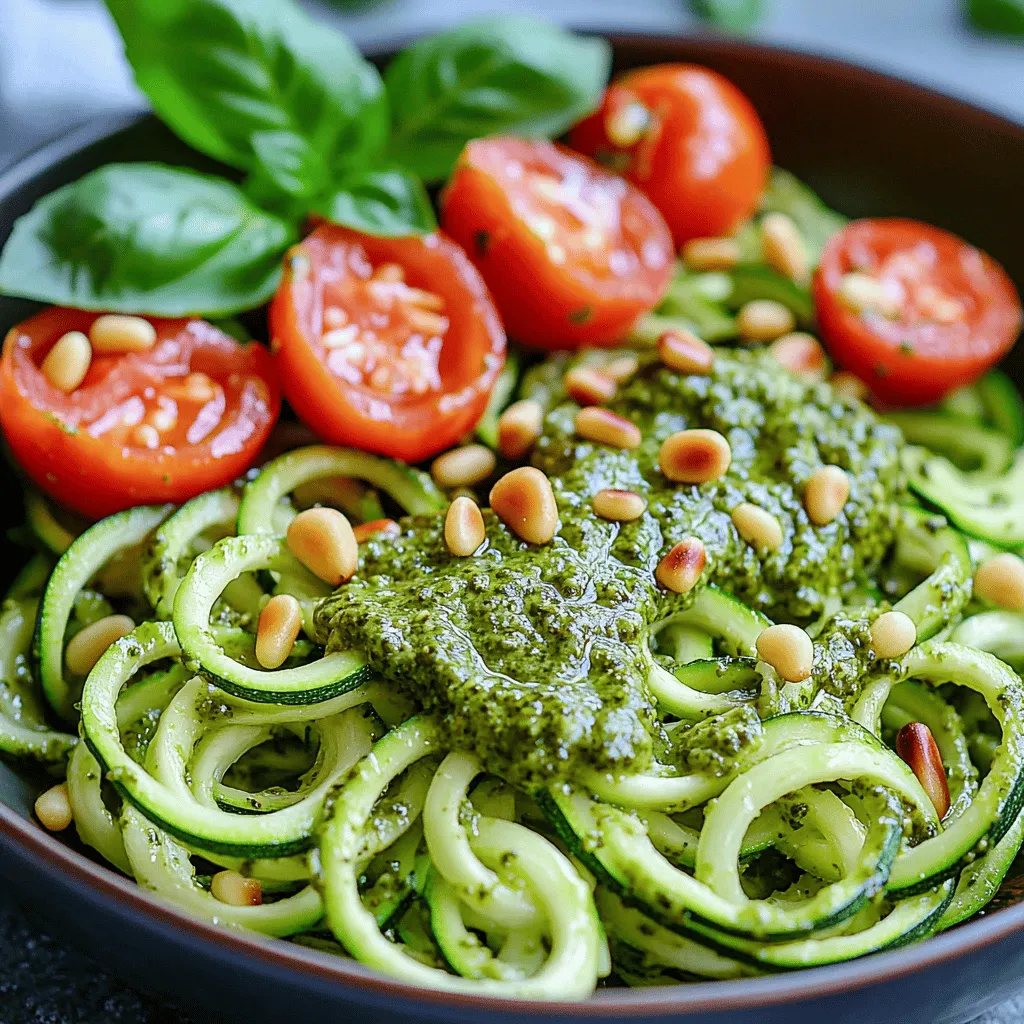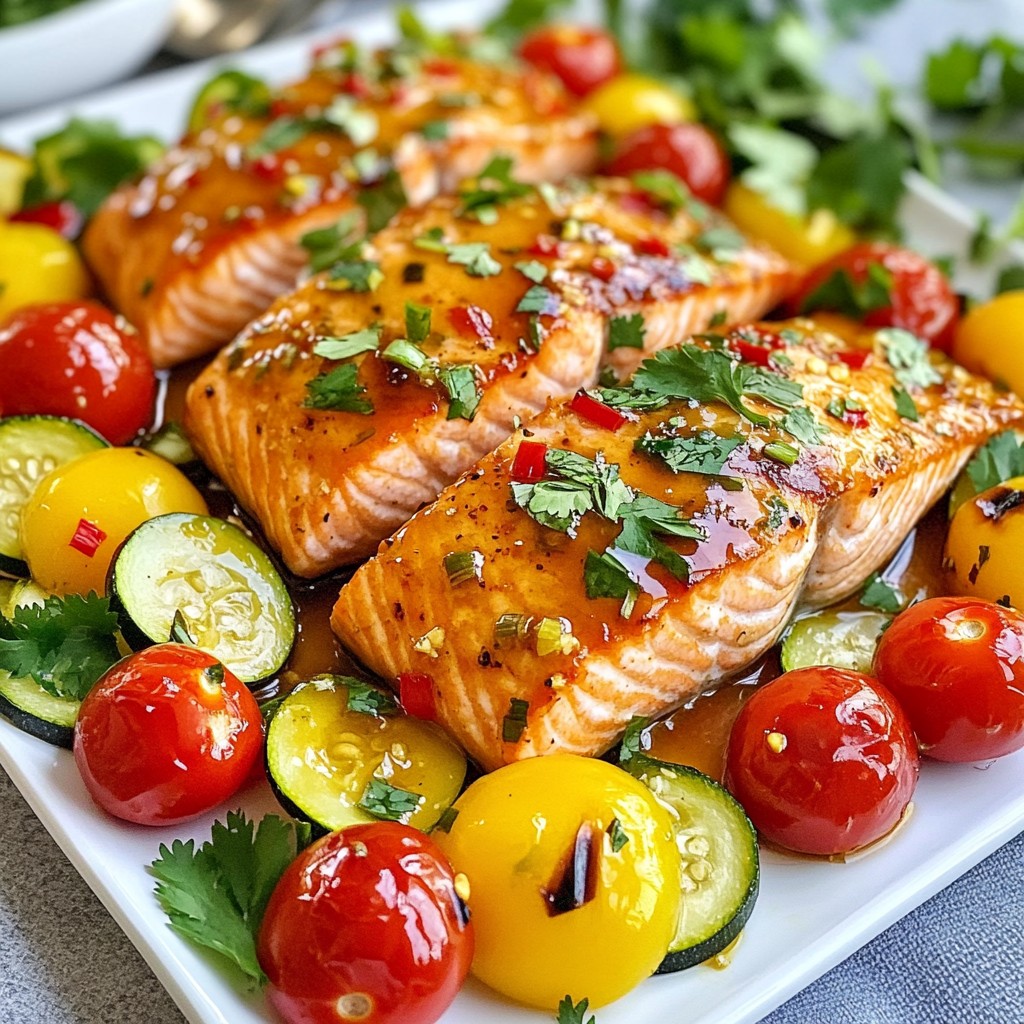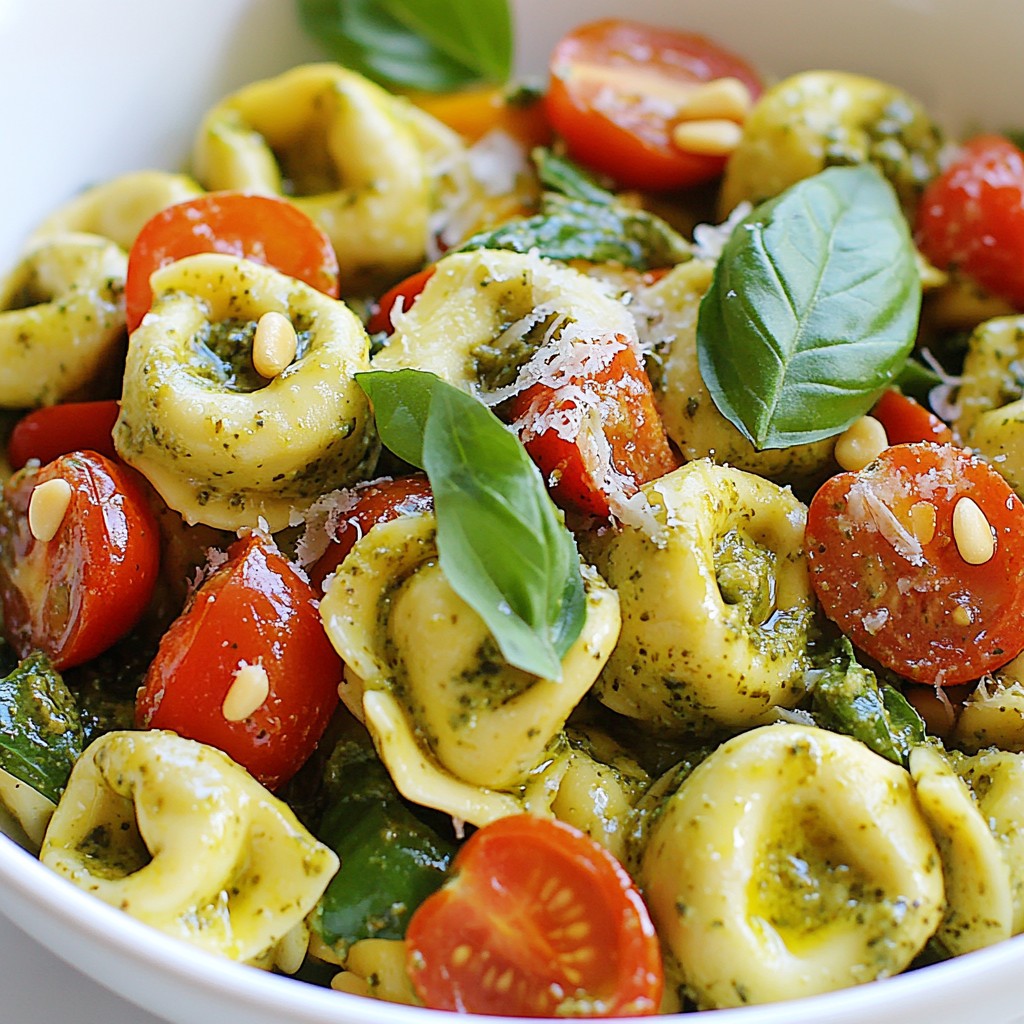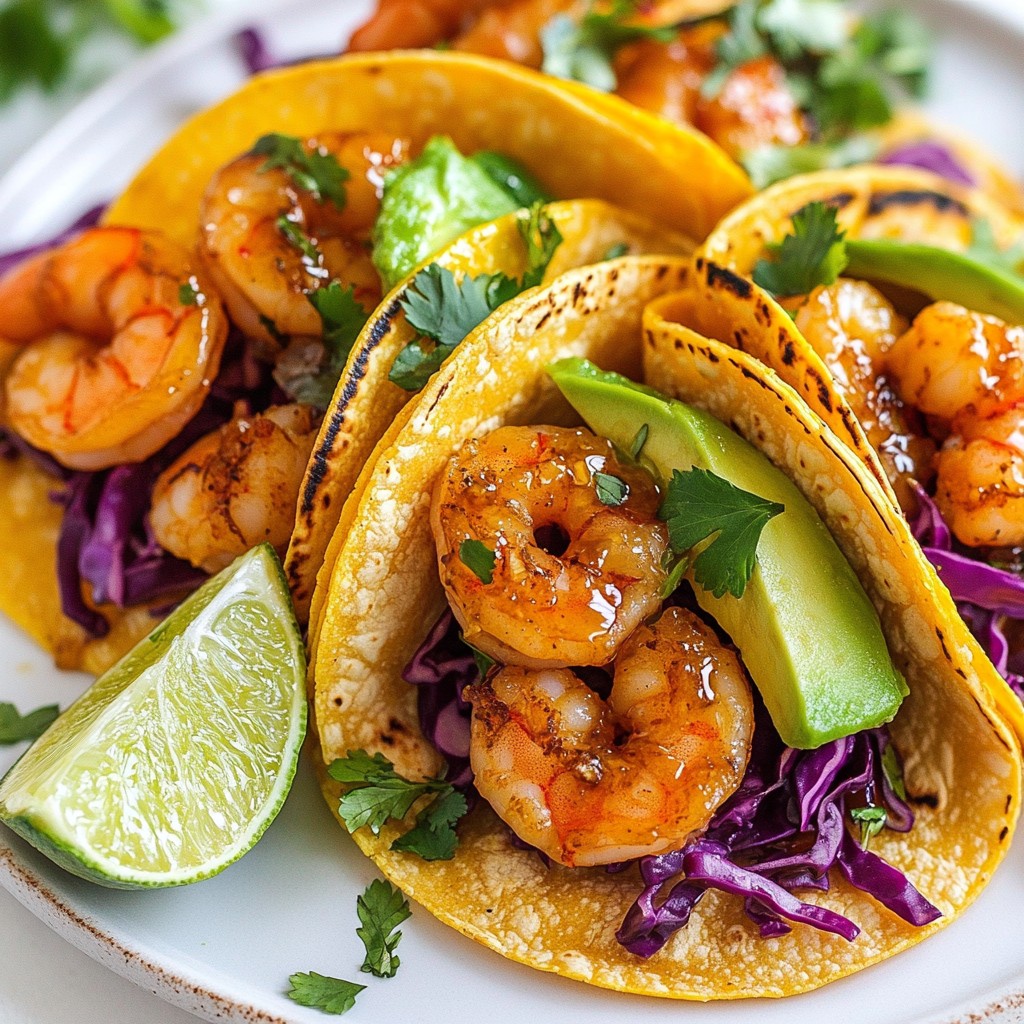If you’re searching for a bright, healthy dish that bursts with flavor, look no further than Zucchini Noodles with Pesto. This easy recipe transforms fresh zucchini into a delicious, guilt-free meal. With its simple ingredients and vibrant taste, you’ll love every bite. Plus, I’ll share tips to master your pesto and keep your noodles crisp. Ready to dive into this tasty adventure? Let’s get cooking!
Ingredients
Main Ingredients Needed
– Zucchini: You’ll need 3 medium zucchinis. Start by washing them well. Then, use a spiralizer to make long, thin noodles. If you lack a spiralizer, a vegetable peeler works too. Slice the zucchinis into thin strips. After cutting, place them in a colander. Sprinkle with a little salt and let them sit for about 15 minutes. This step helps to draw out excess moisture.
– Fresh Basil: Always use fresh basil for the best flavor. Fresh basil adds a bright taste that dried herbs just can’t match. Plus, fresh basil gives your dish a lovely green color. You will need 1 cup of fresh basil leaves.
– Pesto Components: The pesto requires a few key ingredients:
– Pine nuts: Use 1/3 cup, but walnuts are a great substitute if you prefer.
– Garlic: You’ll need 2 cloves, minced for a strong flavor.
– Parmesan cheese: Add 1/4 cup. This gives the pesto a creamy texture. For a vegan option, use nutritional yeast instead.
– Olive oil: A half cup of extra virgin olive oil makes the pesto smooth and rich.
Optional Garnishes
– Cherry tomatoes: Halved cherry tomatoes not only add a pop of color but also a sweet flavor. They pair well with the savory pesto and zucchini.
– Extra basil leaves: A few fresh basil leaves on top make for a beautiful presentation. They also enhance the aroma and flavor.
– Alternative nuts: You can use walnuts or sunflower seeds if you want to mix things up. Both options add a nice crunch and flavor to your dish.
Step-by-Step Instructions
Preparing Zucchini Noodles
To start, you need to make the zucchini noodles. You can use a spiralizer to create long, thin noodles. If you don’t have a spiralizer, a vegetable peeler works too. Just peel the zucchini into thin strips.
Next, we need to draw out moisture from the zucchini. Place the noodles in a colander and sprinkle them with a little salt. Let them sit for about 15 minutes. This helps keep your dish from getting soggy.
Making Homemade Pesto
Now, let’s make the pesto. Use a food processor for this step. Add fresh basil leaves, pine nuts, minced garlic, and Parmesan cheese. Pulse the mixture until it is coarsely chopped.
As you pulse, slowly drizzle in the olive oil. This creates a creamy texture. Make sure to taste and adjust the seasoning with salt and pepper. You want a nice balance of garlic, cheese, and nuts.
Cooking Zucchini Noodles
Once your pesto is ready, it’s time to cook the noodles. Heat a large skillet over medium heat. Add the zucchini noodles and sauté them for about 2-3 minutes. You want them to be soft but still firm.
Keep an eye on the temperature to avoid sogginess. Cooking them too long can cause them to lose their nice texture.
Combining and Serving
After cooking, remove the skillet from heat. Toss the warm zucchini noodles with the prepared pesto. Make sure every noodle gets a nice coat of the sauce.
For serving, plate the zucchini noodles in a shallow bowl. You can top them with halved cherry tomatoes and fresh basil leaves. This adds color and makes your dish look beautiful.
Tips & Tricks
Perfecting Zucchini Noodles
To avoid wateriness in your zucchini noodles, follow these steps:
– Salt the Zucchini: After spiralizing, sprinkle salt on the noodles. Let them sit in a colander for about 15 minutes. This helps draw out excess moisture.
– Pat Dry: After draining, use a paper towel to pat the noodles dry. This extra step ensures they stay firm and not soggy.
To maintain crunch, cook the zucchini noodles quickly.
– Sauté Briefly: Keep the cooking time to just 2-3 minutes. This way, the noodles soften but still hold their shape.
– Avoid High Heat: Cooking over high heat can make them mushy. Medium heat is best to keep that nice texture.
Storing and Reheating Pesto
For storing pesto and keeping it fresh, try these tips:
– Use an Airtight Container: Pour the pesto into a container and cover it tightly. This helps prevent air from making it brown.
– Add Olive Oil: Drizzle a thin layer of olive oil on top of the pesto before sealing it. This keeps it vibrant and tasty.
When it comes to reheating zucchini noodles, here’s how to do it right:
– Use Low Heat: Gently heat the noodles in a pan with a little olive oil. This warms them without overcooking.
– Mix with Fresh Pesto: Toss the leftover noodles with fresh pesto right before serving. This keeps the flavors bright.
Flavor Enhancements
To enhance your dish, consider adding proteins:
– Grilled Chicken: Slice and add grilled chicken for extra flavor and protein.
– Shrimp: Quickly sauté shrimp in olive oil. Toss them in with the noodles.
– Chickpeas: For a plant-based option, add chickpeas for a nice crunch.
Complement your dish with seasonings:
– Red Pepper Flakes: If you like some heat, sprinkle red pepper flakes on top.
– Lemon Zest: A touch of lemon zest brightens the flavors beautifully.
These tips will help you create a delicious Zucchini Noodle Delight with Pesto.
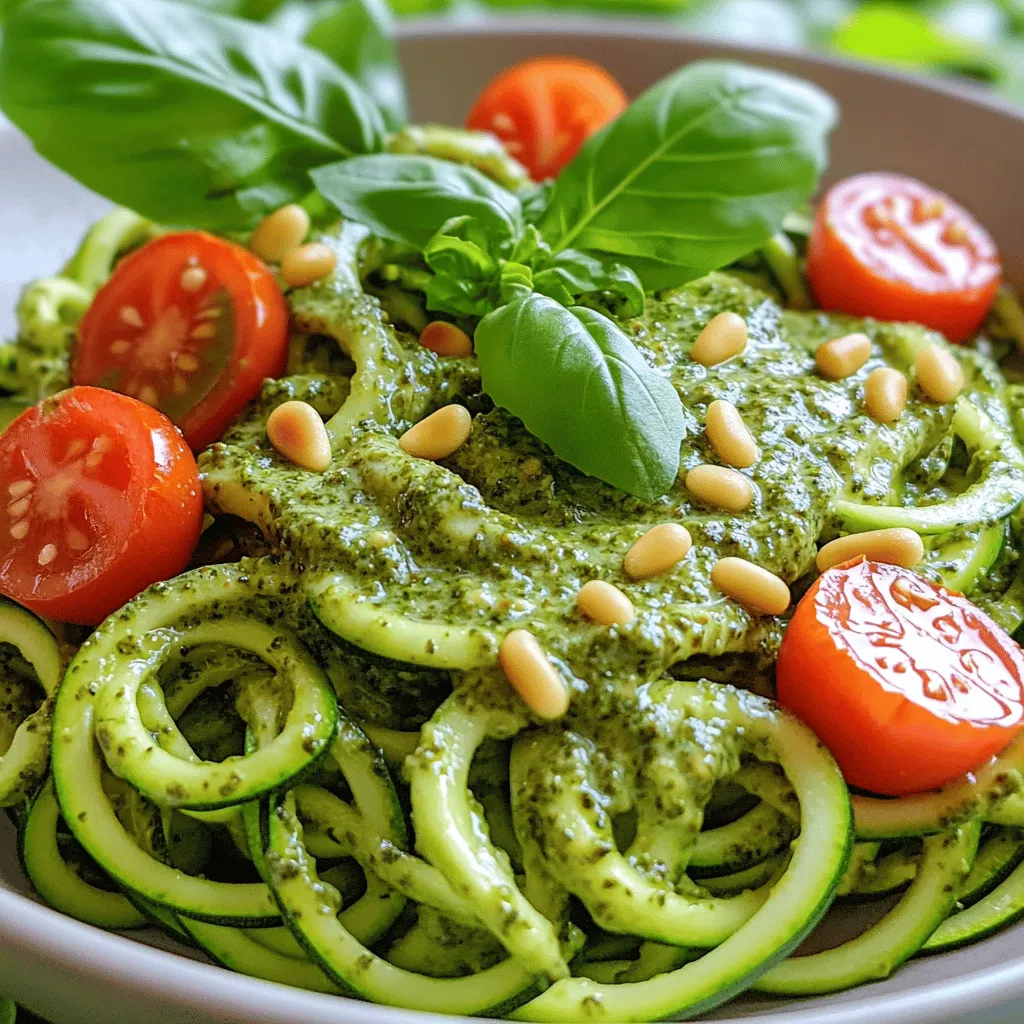
Variations
Low-Carb Alternatives
Substituting pasta: You can use other vegetable noodles if you want a change. Consider using spaghetti squash or carrot noodles. Both options keep the dish light and fresh.
Keto-friendly options: If you follow a low-carb diet, adjust the ingredients. Use nutritional yeast instead of cheese. This swap adds a cheesy flavor without the carbs.
Vegan Adaptations
Nutritional yeast: This ingredient works well as a cheese substitute in pesto. It gives your sauce a savory taste that most people love.
Choosing plant-based proteins: You can add chickpeas or lentils for protein. They blend well with the flavors and boost nutrition.
Customizing Your Pesto
Experimenting with other greens: You don’t have to stick to basil. Try spinach, arugula, or kale for a twist. Each green brings its unique taste and color.
Nut substitutions: If you have allergies, swap pine nuts for sunflower seeds or pumpkin seeds. These nuts provide crunch and flavor without any risk.
Storage Info
Storing Zucchini Noodles
To keep your zucchini noodles fresh, store them in the fridge. They last about 2-3 days. Place them in an airtight container or a resealable bag. Adding a paper towel can help absorb extra moisture.
Freezing zucchini noodles is also an option. However, they may lose some texture. If you choose to freeze, blanch them first. This helps keep their color and taste. After blanching, cool them quickly in ice water. Then, drain and pack them in freezer bags. They can last up to 3 months in the freezer.
Preserving Pesto
To keep your pesto vibrant, store it in an airtight container. Cover the surface with a thin layer of olive oil. This prevents oxidation and keeps the green color.
Pesto stays fresh in the fridge for about 5-7 days. If you see any browning, simply stir it before using. For longer storage, consider freezing pesto in ice cube trays. Once frozen, transfer the cubes to a freezer bag. This way, you can use small amounts whenever you want.
FAQs
How do you make zucchini noodles without a spiralizer?
You can make zucchini noodles using a vegetable peeler or a sharp knife. First, wash the zucchini. Then, use the peeler to create long, thin strips. If you prefer, you can slice the zucchini into long, thin strips with a knife. These methods give you great noodles without needing a spiralizer.
Can zucchini noodles be eaten raw?
Yes, zucchini noodles can be eaten raw. They taste mild and fresh. Eating them raw keeps all the nutrients intact. They pair well with pesto, adding a nice crunch and flavor. You can also add cherry tomatoes for a pop of sweetness.
What to do if my zucchini noodles are too watery?
If your zucchini noodles are too watery, sprinkle them with salt. Let them sit for about 15 minutes. This helps draw out excess moisture. Afterward, you can pat them dry with a towel. Sautéing them briefly can also help reduce water content.
How can I make this a meal prep dish?
To prep zucchini noodles ahead of time, spiralize them and store them in an airtight container. Keep them in the fridge for up to three days. You can also make the pesto ahead and store it separately. When ready to eat, just sauté the noodles and mix in the pesto. This keeps your meal fresh and tasty.
In this blog post, we explored how to make delicious zucchini noodles with homemade pesto. I shared essential ingredients and step-by-step instructions for creating this healthy dish. You learned about tips for perfecting the noodles, variations for different diets, and storage methods to keep your ingredients fresh.
This meal is easy to customize and great for any occasion. Enjoy experimenting with flavors and make this dish your own!

